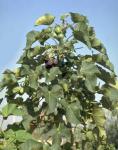CHIBAS to Hold Haiti's First Jatropha Conference (June 25-26, 2009)
 CHIBAS is a non profit organization dedicated to developing the bio-fuel sector in Haiti. From June 24-25, CHIBAS will host Haiti's first Jatropha Stakeholders Conference in Port au Prince. This confrence will bring together NGOs, the private sector, and the government to help build partnerships needed to make jatropha a viable biofuel for Haiti. An invite to the event is attached. If you need further information, you can reach founder Gael Pressoir at info@chibas-bioenergy.org
CHIBAS is a non profit organization dedicated to developing the bio-fuel sector in Haiti. From June 24-25, CHIBAS will host Haiti's first Jatropha Stakeholders Conference in Port au Prince. This confrence will bring together NGOs, the private sector, and the government to help build partnerships needed to make jatropha a viable biofuel for Haiti. An invite to the event is attached. If you need further information, you can reach founder Gael Pressoir at info@chibas-bioenergy.org
What is Jatropha? According to CHIBAS, jatropha is a drought-resistant shrub with a set of unique properties. It helps alleviate soil degradation and prevents wind and water soil erosion, allowing reforestation and restoration of degraded land. Additionally, jatropha sheds its leaves during the dry season, allowing for soil enrichment and long-term improved soil fertility. It is often used as a living hedge or fence by farmers in the developing world. Jatropha is a bush that can grow in most regions around the equator. It has few requirements with respect to its environment. Because of this, jatropha can grow in areas that are unsuitable for other plants, because they are too dry or too arid, or because they have been left by humans because of soil depletion.
For these reasons, many countries have been experimenting with jatropha. There has been considerable discussion on the potential of jatropha for Haiti but much of the information available is anecdotal at best. CHIBAS notes that policy makers need evidence with which to make informed decisions about land use and the promotion of a biodiesel agro-industry.
It will take more than planting seeds to make this industry viable. We need to know which types grow best in Haiti and under what conditions as well as how best to process the jatropha, distribute it, and sell it. Technical expertise is required to help coordinate and expand the many small scale jatropha projects underway in Haiti. CHIBAS research includes intercropping, pruning, use of bee hives to enhance fruit production, minimization of agricultural input, maximization of production/cost ratio and mechanization of harvesting. CHIBAS is also looking into the potential of jatropha as an animal feed and organic fertilizer. The jatropha byproducts could be used for briquettes instead of wood based charcoal.
CHIBAS is also involved in the development of Sweet Sorghum as an alternative source of energy, food and feed in Haiti and the Dominican Republic. The Sweet Sorghum program is intended to evaluate, breed, release and disseminate improved Sweet Sorghum varieties in Haiti and the Dominican Republic and establish appropriate agronomic and crop management practices. Some countries, such as Brazil, have enough land and water to make sugarcane based biofuel viable. Sweet Sorghum has multiple uses, requires less water than sugarcane, and requires only 4-5 months from planting to harvest.
CHIBAS has already established contacts and initiated partnerships with international partners interested in broadening the Jatropha and Sweet Sorghum research community. These include researchers at Cornell University and Texas A&M University and the International Crops Research Institute for the Semi-Arid Tropics (ICRISAT) in India.
We hope this conference will promote coordination among those involved in jatropha cultivation in Haiti and those who may be considering it. Once organized, the Haiti jatropha community can look at possibilities to partner with the Dominican Republic and other Caribbean countries.
Thanks!
Bryan
Add new comment